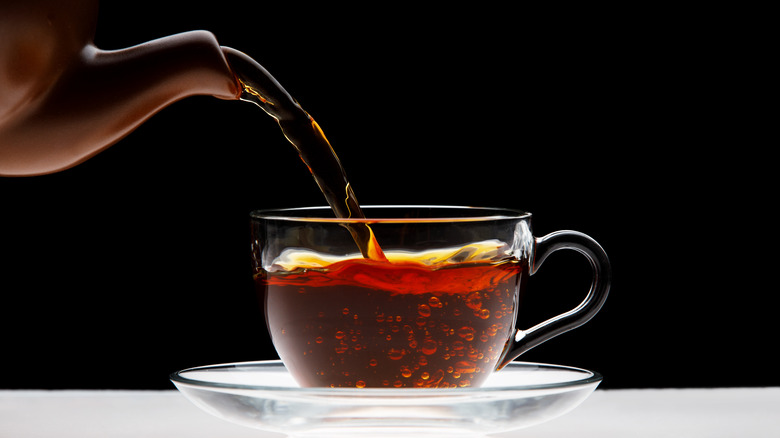How Drinking Black Tea Every Day Affects Your Body
If you're a tea drinker, that can mean a number of different things. Perhaps you're a fan of fruity teas, such as passion fruit or something citrusy to start your morning off on the right foot. Alternatively, maybe you're more of an herbal tea enthusiast, opting for flavors like chamomile, lavender, or peppermint. If you prefer something a little bolder, however, maybe black tea is your tea of choice, with natural flavors of the more smoky or earthy variety, as described by Artful Tea.
Brewed from the leaves of the Camellia sinensis plant, black tea can be enjoyed piping hot or ice cold, notes WebMD. Usually deep brown in color, some people reach for a cup of black tea over coffee as their caffeinated drink of choice. Still able to provide us with the surge of energy we crave, black tea contains less caffeine than coffee. For some, this may be a more desirable choice to reduce caffeine-related side effects, such as anxiety, trouble sleeping, headaches, and more. For comparison, Healthline reports that an 8-ounce cup of coffee contains roughly 95 milligrams of caffeine, while the caffeine content of an 8-ounce cup of black tea is nearly half that, standing at 47 milligrams. In addition to lowering one's caffeine intake, here are some other health benefits that drinking black tea on a daily basis can have on your body.
Drinking black tea may lower your cholesterol and blood pressure levels
The body has two types of cholesterol. One is considered "good" cholesterol, while the other is labeled as "bad" cholesterol. The bad cholesterol — low-density lipoprotein (LDL) — directs cholesterol to our cells, rather than away from them, which is the role of our good cholesterol (via Healthline). Over time, an accumulation of bad cholesterol can lead to the formation of plaque within our arteries. When this happens, it hinders our blood flow and makes us more susceptible to stroke or heart failure. However, a 2003 study published in the Journal of Nutrition found that consuming 5 cups of black tea daily reduced participants' LDL levels by over 11%.
Similar to having high levels of LDL, having high blood pressure, otherwise known as hypertension, can also increase one's risk for heart failure, amongst other health conditions, reports Healthline. When coupled with healthy lifestyle choices, such as regular exercise and stress reduction techniques, experts say that daily black tea consumption may help lower blood pressure levels in people with hypertension.
You may reduce your risk for all-cause death
Due to its flavonoid and antioxidant properties, drinking black tea every day may also help reduce one's risk of all-cause mortality, according to a recent 2022 study published in Annals of Internal Medicine. Researchers gathered data from nearly 500,000 participants in the U.K. between the ages of 40 and 69. Participants were surveyed in regard to health status, lifestyle factors, and demographic information. In addition to receiving physical exams, participants also reported how many cups of tea they generally drink per day and how hot they liked their tea. Among more than 56,000 reported tea drinkers, nearly 90% reported drinking black tea on a regular basis.
Over the course of an 11-year follow-up period, the research revealed that those who consumed at least two cups of tea each day were 9% to 13% less susceptible to all-cause mortality compared to those who reported being non-tea drinkers, as per a media release from the National Cancer Institute. Not only that but a connection between tea drinking and rates of cause-specific death was also observed. Specifically, drinking a greater amount of tea was linked with a lower risk of heart disease and stroke-related death.
There are mental health benefits to be gained
In addition to supporting our physical health, it appears that daily consumption of black tea may also support our mental health in a variety of ways. In a 2021 study published in African Health Sciences, roughly 30% of the study's 491 participants met the diagnostic qualifications for depression. All participants were office workers in Turkey and each of them drank black tea. In analyzing participant amounts of daily black tea consumption, it was found that drinking anywhere between 1 to 4 cups of black tea each day had protective effects against depression. Risk of depression was also found to be reduced in connection with daily caffeine consumption which fell between 450 milligrams to 600 milligrams.
Lending further evidence to these findings, a 2013 scientific review published in The American Journal of Clinical Nutrition examined the relationship between drinking black tea and one's state of mind. Researchers point out that studies have shown a link between black tea consumption and feelings of relaxation, refreshment, and satisfaction amongst tea drinkers. Researchers also took a look at black tea's effects on attention, citing a study that demonstrated black tea consumption was associated with better accuracy and attention when switching between cognitive tasks.
How much black tea should you drink each day?
As we've seen, drinking even just 1 cup of black tea per day can offer the mind and body a host of health benefits. However, it's important to remember that, as a caffeinated beverage, black tea does not come without the risk of side effects. WebMD notes that when consumed in excess, black tea can leave one feeling nervous, restless, and anxious, as well as induce frequent urination, ringing in the ears, nausea, quickened breathing, and more. It's also important to note that black tea, whether in liquid or supplement form, may also interact with certain medications. Therefore, be sure to consult with your doctor beforehand.
So how much black tea is too much? Experts state that it's best to drink no more than 4 cups of black tea daily (via WebMD). Exceeding this amount may pose risks to one's health, as well as drinking black tea with caffeine concentrations greater than 10 grams. Those who are pregnant, as well as those who are breastfeeding, should not drink more than 3 cups of black tea per day, as experts say that high amounts of caffeine consumption have been linked to potential infant health issues.





